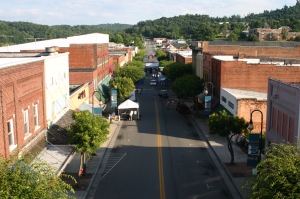
This is the second in a series about poverty issues in Southwest, Southside and the Eastern Shore of Virginia
By August Wallmeyer
In my travels throughout the poor, rural areas of Virginia, one disheartening fact became very obvious. Young people in Virginia today are engaged in the same kind of disruptive economic migration that newly freed slaves in the South faced after the civil war: the need to relocate to search for gainful work and the dignity work brings to families. Just as in the late 1800s, those fleeing Southwest, Southside and the Eastern Shore of Virginia (areas I called The Extremes of Virginia in my recent book) are forced to break apart multi-generational families, discard their regional traditions and abandon ties to their native cultures, all in search of jobs, economic opportunity and education.
Today’s economic migrants are frustrated with the lack of local opportunities to trade honest work for a living wage to support themselves and their families. And the young people—and more than a few older ones, as well—have no other choice but to pull up stakes and head for greener pastures.
In those rural, poor areas of Virginia I wrote about population declined 2.3 percent in the first five years of this decade, compared to population growth of 4.1 percent in Virginia as a whole. And as a direct result, those rural, poor areas are becoming even poorer and older.
In The Extremes, the poverty rate is 67 percent higher than the statewide average. Household incomes average only 59 percent of statewide, and only 54 percent are in the civilian labor force, compared to 65 percent in Virginia. Sadly, suicide and illegal drug use are much more common in these economically bereft areas as well.
Federal and state governments, with good intentions, have tried to help, but without major successes. More than 50 years ago President Lyndon Johnson famously declared “war on poverty” in Appalachia. After spending more than $22 trillion (more than three times the cost of all U.S. wars) on anti-poverty programs, the poverty rate is essentially unchanged.
Today, Virginia’s latest jobs and economic development effort, GO Virginia, seeks to attract highly educated and trained professional workers and businesses to the Commonwealth, because these types of high-paying jobs have a larger “economic multiplier” effect on our economy. Fair enough, perhaps. We need trained professionals. But the GO Virginia strategy begs an important question: what about our citizens already here in Virginia who lack the education and training to become these desired professional workers and are woefully unprepared for the “better” professional jobs? In The Extremes, high school graduation rates are vastly inferior to the statewide statistics. And college graduation rates are less than half the statewide average. So these fellow citizens in rural, poor, less educated Virginia, hungry for any honest employment, aren’t likely to benefit from GO Virginia at all.
Catholic teaching is replete with references to the dignity of work, which is a fundamental human right. Performed by men and women who have their own inherent dignity, work also has dignity. It allows them to provide for their own basic needs and those of their families. Pope Francis has been quoted saying “We do not get dignity from power or money or culture. We get dignity from work.”
Perhaps our governmental and business leaders should consider exactly how the dignity of work will come to rural, poor Virginia?

August Wallmeyer, a member of the VCC Management Committee, is a former broadcast journalist, a semi-retired lobbyist, and the president of August Wallmeyer Communications. Find “The Extremes of Virginia,” here